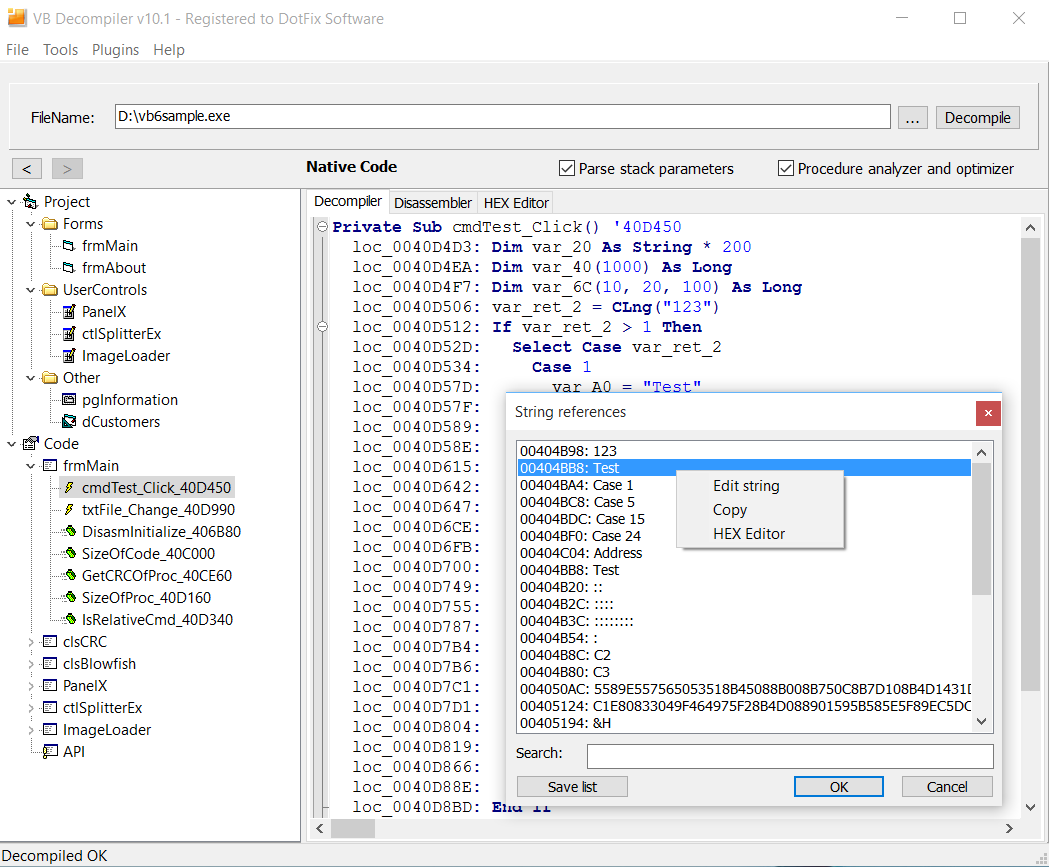Microsoft Visual Basic 6 Decompiler
I asked this same question a while back, so hopefully this thread helps. Edit: This thread got me thinking more about this topic and any changes since my thread from 9 years ago. At my company, we have a handful of VB6 applications that are being re-written, but we do not have source.
(Another sin of the past that we are dealing with, but I digress.) This gave some decent options for viewing the native code if necessary (e.g. Evaluate a user assertion about the product's behavior, or see what queries are being executed and how). Click to expand.No, I have to rewrite the program in VB.NET.
It is a frontend for data entry / report generation/viewing for an Access DB which I already converted to 2007+ format. So the old interface is not only looking for an old file name, but also will not work with the new format. I guess I could make an intermediary program, but that would mean that it would probably stop working at some point in the future anyway and make stuff more complicated than it needs to be. Plus a lot of the older VB to Access DB calls are deprecated and will not work at all anymore as I found out last time I had to convert a VB6 program to VB.NET for a different site. We had the original source code for that though so it was pretty easy to change over. Nice progress so far, glad things are working for you! If you are still using MS Office interops in your code stack, you may want to look into the DLLs.
They act as a bridge between your Interop/PIA calls and the actual installed version of MS Office, but without the version-specific requirement of Office DLLs - it will simply work with any version of Office installed on the destination machine. We've been using it for some internal Excel and PowerPoint interaction at my company, and the switch was painless. Nice progress so far, glad things are working for you! If you are still using MS Office interops in your code stack, you may want to look into the DLLs. They act as a bridge between your Interop/PIA calls and the actual installed version of MS Office, but without the version-specific requirement of Office DLLs - it will simply work with any version of Office installed on the destination machine. We've been using it for some internal Excel and PowerPoint interaction at my company, and the switch was painless.

After fighting with VB to save the updates to the DB for a few hours yesterday. No errors, it just acted like it was saving and then when I loaded it back up, the old data was there.
Read a huge number of posts, ideas, and anything I could find on it. Tried a few different ways and nope, nada, nothing.
Come to find out, it doesn't save the data to the real db you are accessing when you run it via Visual Studio, but to a copy of the db it puts in the bin folder with the executable. Maybe just a configuration issue/misunderstanding on my part. Overall though, VB.NET in VS2015 rocks for doing DB front ends. Once you figure it out, it is pretty sweet as it does pretty much all of the hard work for you.
From VB Decompiler is decompiler for programs (EXE, DLL or OCX) written in Visual Basic 5.0 and 6.0 and disassembler for programs written on.NET technology. As you know, programs in Visual Basic can be compiled into interpreted p-code or into native code.NET assembly always compiled to just in time compilable IL code. Since p-code consists of high-level commands, there is a real possibility to decompile it into the source code (of course, the names of variables and some functions will not be decompiled). VB Decompiler restores source code from p-code as much as possible precisely. And after some modifications you may try to compile generated code. If a program was compiled into the native code, restoring full source code from machine instructions is not possible.
But VB decompiler can help to analyze the program even in this situation as well. Ps3 pkg to iso. It contains a powerful disassembler and emulator. This powerfull engine try to decode most assembler instructions to most likely VB commands. Of course, it fails on some optimizations of assembler code and sometimes generate not correct instructions. But at this time this is a best way to analyze native code applications.
If a program was compiled to.NET assembly, decompiler will recovery all tables and modules in managed assembly and disassemble all methods, functions and events using IL disassembler.NET FrameWork is not needed for decompilation. Decompilation supported on all Windows 32 bit operation systems. In general, VB Decompiler is an ideal tool for analyzing programs and it is perfect if you lose the source code and need to partially restore the project. Full Specifications What's new in version 10.3 Version 10.3 may include unspecified updates, enhancements, or bug fixes.
Microsoft Visual Basic 6 Decompiler Download
General Publisher Publisher web site Release Date February 07, 2016 Date Added March 09, 2016 Version 10.3 Category Category Subcategory Operating Systems Operating Systems Windows XP/2003/Vista/Server 2008/7/8/10 Additional Requirements None Download Information File Size 5.29MB File Name vbdecompilerlite.zip Popularity Total Downloads 415,170 Downloads Last Week 713 Pricing License Model Free to try Limitations Code decompilation disabled Price $99.